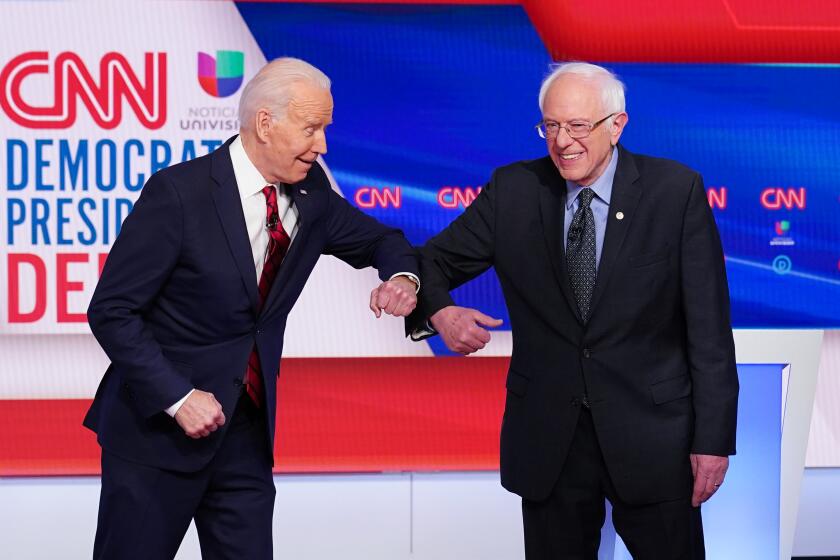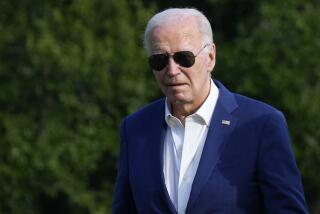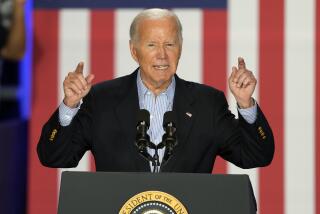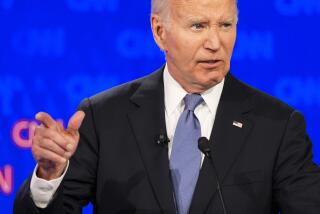6 takeaways from the Joe Biden-Bernie Sanders Democratic debate
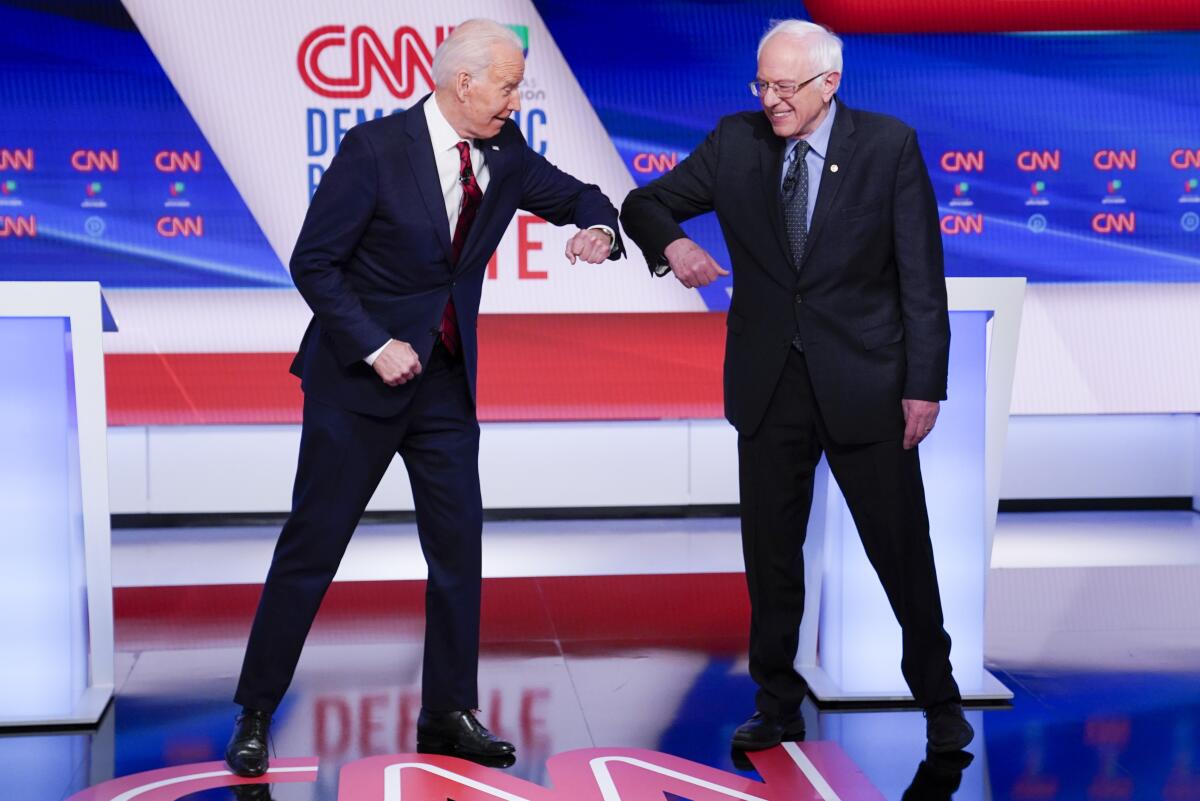
- Share via
It wasn’t tea for two. It wasn’t landmines and firefights and all-out political warfare, either.
Rather, Joe Biden and Bernie Sanders — the last two major Democratic presidential candidates standing — parsed their differences in an often-testy two-hour debate held in the shadow of the nation’s spreading coronavirus epidemic.
Here are six takeaways:
Coronavirus casts a shadow
It was an elbow bump seen ‘round the world.
From the very first moment, it was clear the growing coronavirus crisis would set the tone and top the evening’s agenda.
In a debate focused heavily on the coronavirus, Joe Biden and Bernie Sanders are asked about their age and risk. Biden commits to picking a female vice president.
Biden and Sanders refrained from the traditional pre-debate handshake, going for the safer flexed-arm touch, then retreated to podiums set a socially distanced 6 feet apart.
Bookending the debate, questions pertaining to the global pandemic — both the health and economic repercussions — took up nearly 40 minutes off the top, and both candidates came prepared to incorporate the crisis into their core messages.
The former vice president, who never misses a chance to tout his time in the Obama White House, distilled his message thusly: I’ve been here before and I know how to handle this.
“We should do what we did before with the Ebola crisis,” Biden said, recalling how he helped marshal the federal government’s response in 2014.
Sanders, meantime, mixed his consistent calls for overhauls of the healthcare system with more immediate steps to blunt the effects of the virus.
“I obviously believe in ‘Medicare for all.’ I will fight for that as president,” the Vermont senator said. “But right now, in this emergency, I want every person in this country to understand that when you get sick, you go to the doctor. … Do not worry about the cost right now, because we’re in the middle of a national emergency.”
Biden agreed the country was in a time of grave peril — one that made so much of the remainder of the debate seem superfluous and largely beside the point.
The Democratic debate turns to the ages of Bernie Sanders (78) and Joe Biden (77) and how they are protecting themselves from the coronavirus.
No knockout blows
At one point there were more than two dozen Democratic presidential hopefuls, many with the same strategy: wait for the front-running Biden to implode, then surge to the nomination.
However, while Biden teetered and came close to toppling, he proved remarkably resilient, going from foot-in-the-grave to front-runner in 72 hours, after a thumping victory two weekends ago in the South Carolina primary.
That left Sanders in a familiar place Sunday night: waiting for Biden — nobody’s idea of a champion debater — to collapse, so he could resuscitate his flagging campaign.
That didn’t happen.
Sanders was the aggressor throughout. He challenged Biden over his position on Social Security, claiming he repeatedly sought to cut the program to balance the federal budget — which Biden denied — criticized his reliance on big-money donors and questioned his commitment to the fight against climate change.
Biden responded forcefully, raising his voice, jabbing a finger and occasionally assuming a theatrical look of wide-eyed incredulity. But if there were times he fell back on his heels, Biden didn’t crumple or fold.
If anything, the frequent bickering over their decades-long political records made both look small at a time when the country has bigger things to worry about.
Let the veepstakes begin!
Prognosticators, get those predictions ready.
Biden dropped the clearest clue yet about who’s in contention to be his running mate should he clinch the nomination. “I commit that I will, in fact, pick a woman to be vice president,” he said. “There are a number of women who are qualified to be president tomorrow.”
Sanders, asked if he would do the same, allowed himself a bit of wiggle room.
“In all likelihood, I will,” he said, adding that it would not just be sufficient to have a woman on his ticket — he would make sure she was a fellow progressive.
‘Medicare for all,’ with a twist
You can set your watch to it: A Democratic presidential debate will devote significant time to Medicare for all.
This was no exception, but the coronavirus crisis added fresh nuance to a discussion often reduced to how such a program would be funded.
Biden went on the offense, questioning Sanders’ depiction of a universal government plan as a cure-all. “You have a single-payer system in Italy,” Biden said, pointing to a nation that is among the hardest hit by the pandemic. “It doesn’t work there.”
Sanders asserted that the coronavirus has thrown already existing cracks in America’s healthcare system into sharp relief, noting the shortage of providers, ventilators and other crucial components for care.
“In a good year, without the epidemic, we’re losing up to 60,000 people who die every year because they don’t get to a doctor on time,” Sanders said. “It’s clear this crisis is only making a bad situation worse.”
Neither ceded any ground.
The durability test
You try standing for two hours, facing a barrage of questions, thinking on your feet in front of a national audience ready to pick up on any verbal slip or mental stumble.
The one-on-one debate would have posed a challenge even if the two participants weren’t pushing 80 — Sanders, 78, and Biden, 77.
With just the two on stage, there wasn’t the respite each was afforded in previous, more crowded sessions when others took turns responding, or were going after one another. (They did enjoy the benefit of three commercial breaks.)
Sanders has seemed the more spry of the two. (Part of it is his energetically arm-waving style of amplification.) In fact, it was a robust Sanders debate performance just two weeks after a heart attack that helped eliminate doubts about his capacity to go forward.
Going into Sunday night, there was some anticipation — and hope on the part of Sanders’ supporters — that Biden would wilt, raising renewed doubts about his capacity to face President Trump.
He was halting at times, though nothing out of the ordinary. Both had a few slip-ups, but neither wound up slumped over their lecterns.
All in all, not a bad night’s work.
Silence is golden
Fears of the spreading coronavirus resulted, in effect, in a debate quarantine.
Rather than fielding questions at a 5,000-seat theater in Phoenix, as planned, Biden and Sanders faced a panel of moderators on a Washington soundstage, with no crowd to cheer, jeer or otherwise interject themselves into the discussion.
So what was the sound, or rather the result, of no hands clapping?
There wasn’t much lost in the absence of audience participation; if anything, the lack of unwanted interruption gave the candidates more time to answer questions and spared them having to respond to people shilling for one rival or another.
For those whose taste runs more to the bombastic, there are plenty of Roller Derby clips or excerpts of the Democrats’ feisty South Carolina debate — was it really less than three weeks ago? — to be found online.
More to Read
Get the L.A. Times Politics newsletter
Deeply reported insights into legislation, politics and policy from Sacramento, Washington and beyond. In your inbox three times per week.
You may occasionally receive promotional content from the Los Angeles Times.
